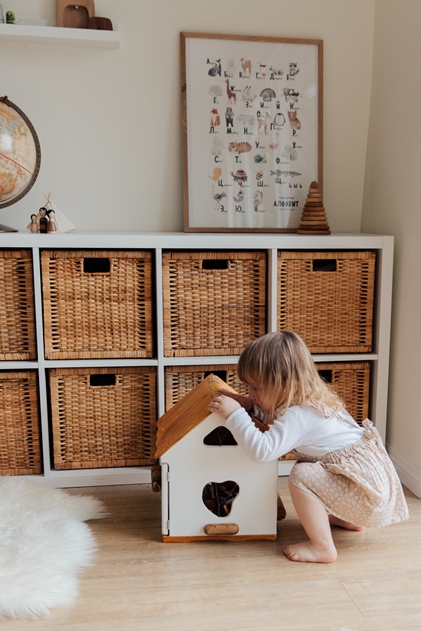|
Unpreschooling, part 1 value of play
by Beverley Paine
You've nurtured the little person in your life through her baby years, held her close and then supported and encouraged her as she toddled through exploring, discovering and investigating her world. Watching her learn is a joy. Her excitement and anticipation, her persistence, stubbornness and determination reassure you that she's a natural learner. Although you take her progress for granted, you are amazed at the speed and efficiency of this little learning machine! It's hard to keep up with her questions and her quest for new and interesting activities to do.
And then your mum says, "Now that she's three I guess she'll be starting preschool soon." It's actually a question, a request for reassurance that you are on track with preparing your child for school and the education she will need to succeed in life.
It's been in your mind for some time that you will home educate your little person. You've done some research and are ready to answer concerns about the legalities, social and academic aspects: in fact, you are feeling really confident about the whole idea and have settled on unschooling as the way your family will approach your children's education. You're keen to foster your child's natural learning ability. And then your mum, who wants to understand and support you, asks: "What is the difference between unschooling her and just letting her play?"
At a glance unschooling the preschooler definitely looks like "letting her play". The value of play and playful learning is lauded by developmental psychologists such as Peter Gray and early childhood educators. For the unschooler, a playful approach to life makes sense. Play embodies creativity and imagination. We are free to explore, discover, experiment, take risks and challenge ourselves when playing. We are, as Bernard DeKoven says in his book, A Playful Path, " vulnerable, responsive, yielding to the moment." Present and responsive. There are no rules other than those we create as we play. Learning is unbounded. Unschoolers trust in their natural sense of playfulness as an essential aspect of growth and development, not just in childhood but throughout life. And they trust and believe that play and curiosity is the foundation of a quality education.
But there's more happening in the little person's life than playing. Living is serious work to children. Playing is serious work too. Unschooling parents understand that a playful attitude and approach to the work we do maintains motivation and interest. This isn't the same as making activities and tasks fun. Fun evolves from doing things playfully. And preschool aged children are right into doing as much as they can, sometimes as obsessively as possible. and all too frequently the very things we'd rather they didn't!
Helping your little person navigate the path of her unique growth and development is challenging. It requires constant questioning and examining of your personal values and motives. It usually involves a gradual process of de-schooling, dismantling the conditioned mantras and trained habits about the nature and role of education you have accumulated and which come at you from every direction. It needs to be supported by a commitment to learning to trust in yourself and your child as natural learners. And that, at any moment in time, your child is learning what she needs to learn, in her own unique way and at a pace that suits that need. As a new mum you had faith in your baby's natural learning ability. As an unpreschooling mum you maintain that faith.
Unschooling is the same as living. It's life without school. Unpreschooling is living and learning without preschool. Instead of prepping your child to write her name, say the alphabet, count to ten or correctly identify colours and shapes because it's expected that three year olds will learn these things, you simply get on with life. You are both busy people doing interesting and constructive things on your own or with each other, taking care of the chores, looking after yourselves and others, getting involved, playing: being and doing. As the mum of an unpreschooler you naturally mark the milestones in your diary or blog, take photos, and stash your child's creations: moments when you recognise your child has mastered a new skill, reached an understanding or insight, or revealed knowledge that you didn't know she had. Your collection of 'moments' reassures you (and others) that living mindfully in this engaged and authentic way is enough, it is an appropriate and comprehensive education.
Between two and three years of age autonomy emerges strongly as an important developmental need. The development of their language skills, perception, memory and mobility assist children gain mastery of their environment. As they explore their growing sense of personal physical and intellectual power, together with the realization that they are individuals, they begin to express, often emphatically or forcefully, their likes and dislikes, needs and wants. As an unpreschooling parent you celebrate and nurture your child's emerging autonomy. By being mindfully attentive and tuning into her needs, likes and dislikes, interests, and how she prefers to learn, you can identify and sometimes anticipate her need and, as a result, it becomes easier to negotiate conflicts that arise when her emerging autonomy clashes with your needs. In a nutshell, getting to know this little person really well, how she ticks and what motivates her, and respecting her as a person, guides your parenting. It becomes a cooperative 'dance', sometimes led by her, sometimes led by you: the object is always the same, building respect and self-esteem, encouraging self-awareness and developing trust.
Choice is an essential element of unschooling: the freedom to learn in the way and at a pace that best suits the individual, what she needs to learn when. Offering her a plethora of choices has the same effect it does on adults: confusion and stress. As an unschooling mum, you know her likes and dislikes and can narrow down the choices to those that are appropriate to the situation. Removing arbitrary rules, limits and unnecessary obstacles and interventions enables the unpreschooler to exercise her ability to tune into her own sense of what she needs, empowering her to make decisions that work for her. Helping her manage and understand the consequences of her choices, both positive and negative, is enabling.
Your mum nods. You can tell she isn't fully convinced, that's she's formulating more questions, and that's okay. But it is time for both of you to play Beetle with the little person.
Unpreschooling, part two will look at how to encourage autonomous, self-directed learners who are interested in a range of activities, and what life as an unpreschooler looks like in practice. See also Unpreschooling part one value of play ,part three the art of strewing, part four schedule versus routine and Unpreschooling favourite toy shops

Photo by Tatiana Syrikova from Pexels

Was this article helpful? Was it worth $1.00 to you?
Your gift of $1 or more helps to keep this site operating
offering encouragement
and reassurance to families
wanting
better outcomes for their children.



Beverley Paine with her children, and their home educated children, relaxing at home.
Together with the support of my family, my aim is to help parents educate their children in stress-free, nurturing environments. In addition to building and maintaing this website, I continue to create and manage local and national home educating networks, help to organise conferences and camps, as well as write for, edit and produce newsletters, resource directories and magazines. I am an active supporter of national, state, regional and local home education groups.
"You've been an inspiration to me, I love the way
you really listen to people." Vanessa
"Whenever I read your writing I always come away
with increased confidence in my ability to provide and
share a wonderful learning journey with my family!" Davina
"Your guidance, understanding, support and words of
wisdom changed our lives. We now offer support and
organise many homeschooling events for others." Lesley
"Thank you once again for your prompt and friendly service.
I am convinced that your books are going to add
quality and peace of mind to my journey of teaching my kids
at home! Just from studying your website, until almost
2am
in the morning, I 've been encouraged!" Louisa
"Thank you for all your many,many reassuring words
over many, many years. You probably don't know exactly how
valuable you are to the Australian Home Education community.
I've been reading your stuff for maybe 8 years or more now.
And I'm very grateful." Gythaa


Want to learn how to write your own education plans
to suit your unique children's individual learning needs?
Or you are looking for quality curriculum and teaching tips...
Comprehensive 3 workbook 'how to home ed' course
covering the essential skills you need
successfully home educate your children

|
|
Welcome to the World of Home Education
and Learning without School!
We began educating our children in 1985, when our eldest was five. In truth, we had helped them learn what they need to learn since they were born. I am a passionate advocate of allowing children to learn unhindered by unnecessary stress and competition, meeting developmental needs in ways that suit their individual learning styles and preferences. Ours was a homeschooling, unschooling and natural learning family! There are hundreds of articles on this site to help you build confidence as a home educating family. We hope that your home educating adventure is as satisfying as ours was! Beverley Paine
3 ESSENTIAL STEP BY STEP GUIDES
Let experienced home educators Beverley, Tamara and April walk you through HOW to create a learning plan that builds on solid foundations that works for YOUR family AND ticks all the boxes for home educaton registration!
|

Tap into Beverley's
experience
through her books
"Your books, your blogs helped me beyond words... they helped me to find comfort in knowing it is ok to choose exactly what is best for my family." Nisha
"Your books and information are mind blowing and already I am feeling good about this new experience." Diane
"Your guidance, understanding, support & words of wisdom changed our lives." Leslie
"I feel specially inspired by Beverley's words and, the more I read her comments, the more inspired I feel, since my need for support, respect for different parenting styles, and information are fully met." Marijo
|
 |
|



The information on this website is of a general nature only and is not intended as personal or professional advice. This site merges and incorporates 'Homeschool Australia' and 'Unschool Australia'.
The Educating Parent acknowledges the Traditional Aboriginal and Torres Strait Islander Owners, the Custodians of Australia, and pay our respects to Elders past and present and extend that respect to Aboriginal and Torres Strait Islander people viewing this website.

Advertise on this site.








Home education is a legal alternative
to school education in Australia.
State and Territory governments are responsible
for regulating home education and have different
requirements, however home educating families
are able to develop curriculum and learning programs
to suit the individual needs of their children.

Without revenue from advertising
by educational suppliers and Google Ads
we could not continue to provide information
to home educators. Please support us by letting
our advertisers know that you found them on
The Educating Parent. Thanks!
|
![]() About
About
![]() Blog
Blog
![]() Articles
Articles
![]() Curriculum
Curriculum
![]() Resource Directory
Resource Directory
![]() Shop
Shop
![]() Facebook
Facebook

![]() SA
SA ![]() VIC
VIC ![]() NSW
NSW ![]() QLD
QLD ![]() TAS
TAS ![]() ACT
ACT ![]() NT
NT ![]() NSW
NSW ![]() QLD
QLD ![]() SA
SA ![]() WA
WA ![]() TAS
TAS ![]() ACT
ACT ![]() NT
NT 
















